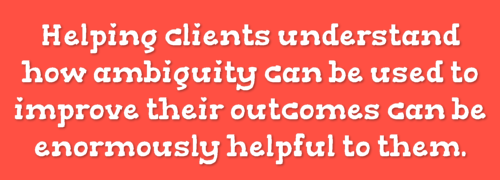I suspect this discussion is going to surprise you as much as it surprised me. The topic is Nonsense, but not Nonsense by its classic definition. No, this Nonsense is quite different, and, frankly, sometimes it chokes me up.
Just published a month ago, Nonsense: The Power of Not Knowing is the title of a new book by Jamie Holmes. Jamie is a Future Tense Fellow at New America, a non-profit, think-tank / forum / media platform that promotes the intellectual study of politics, prosperity and purpose. Part science, part expos, part business lesson, Nonsense will surely leave you looking at your world very differently. It is extremely well-researched, easy to understand and, truly, just fascinating.
Specifically, Jamie’s Nonsense promotes ambiguity, its great utility for big decision-making, and its role in improved outcomes. And he makes a very good case for it.
Not what you expected, right?
In my lifetime, I have never handled ambiguity well. To me, it’s anxiety-producing limbo. It’s the road to hell – not knowing – not having the answers I think I need – not knowing how to deal with an important situation because I don’t have the important details. To me, ambiguity becomes an additional problem that just exacerbates the original problem. I can’t solve my problem or formulate my plan when I don’t have all the facts.
I raise this today for a few very different reasons. Primary among them is that ambiguity and its resulting fear, uncertainty, or doubt are at the core of every reason patients look for help from advocates! So it follows that a book that proves the claim that ambiguity can play a positive role in outcomes requires us to pay attention.
Now, I’ll confess, this is not a book I would have just picked up to read on my own – not these days. Not that I wouldn’t love to take the time to read it – I certainly would. Back in my pre-self-employed days I loved nothing more than to delve into great business-thinking-theory books – authors like Malcolm Gladwell or Steven Levitt or Dan Ariely. Rarely can I find time today.
However, Nonsense has been on my radar for a long time because, well, my story is in it*. Jamie and I have been exchanging email and editing together for more than two years.
(Granted, I had no idea his book would be called Nonsense! But I’ll confess I love the title. I love the idea of playing an important role in Nonsense. 
My role, a chapter in the book, is called “Overtested USA, When to Resist Momentum.” Beginning on page 111 (or location 1670 if you’ve got an e-reader), Jamie tells my story in even more detail than I have ever told it publicly. I’ll admit, I crumbled when I first read it – sitting in an airplane on a long flight to San Francisco, I used up an entire pocket pack of tissues. (I still suffer some PTSD after all these years.) He then uses my story to illustrate that one of the biggest causes of misdiagnosis and medical errors is because doctors (and their patients) are so ambiguity-phobic that they rush to judgment. Even in the face of huge questions and conflicting evidence, they are “positive” about their answers. Further, all that uncertainty causes doctors to order tests and treatments that are totally unnecessary to try to overcome the ambiguity – which puts patients at even more at risk.
So true. Every day patients are being overtested and overtreated – for no good reasons.
So – beyond my delight and appreciation to Jamie for his truly excellent work – why do I call your attention to this today?
First, for the reason stated above. That every single patient who goes in search of an advocate does some because of fear, uncertainty or doubt – all parts of the FUDGE theory we use in our marketing (Fear, Uncertainty, Doubt, Guilt, Exhaustion.)
But second, and perhaps more importantly, because what our patient-clients expect from their relationship with us is to relieve that ambiguity. Helping clients understand how ambiguity can be used to improve their outcomes can be enormously helpful to them! if you aren’t helping your clients understand how to temper their frustration over their ambiguity in order to lead them into better decision-making well, then, Nonsense is a good read for you.

Do yourself a favor and bone up on how ambiguity can help your clients find the best answers. It’s worth your time, and it’s worth their time to let you explain it. The research cited is staggering and convincing and not one bit ambiguous.
Which is why I like it. Because, while it may be Nonsense, it isn’t, really.
- Learn more about Nonsense: The Power of Not Knowing from Julie Beck’s interview of Jamie Holmes in The Atlantic: The Benefits of Getting Comfortable with Uncertainty
- Purchase Nonsense from Amazon.
LEARN ABOUT APHA MEMBERSHIP | FIND MORE REASONS PATIENTS NEED ADVOCATES
*If you would like to make the story comparisons – the Nonsense version is cited above. My version can be found here.




